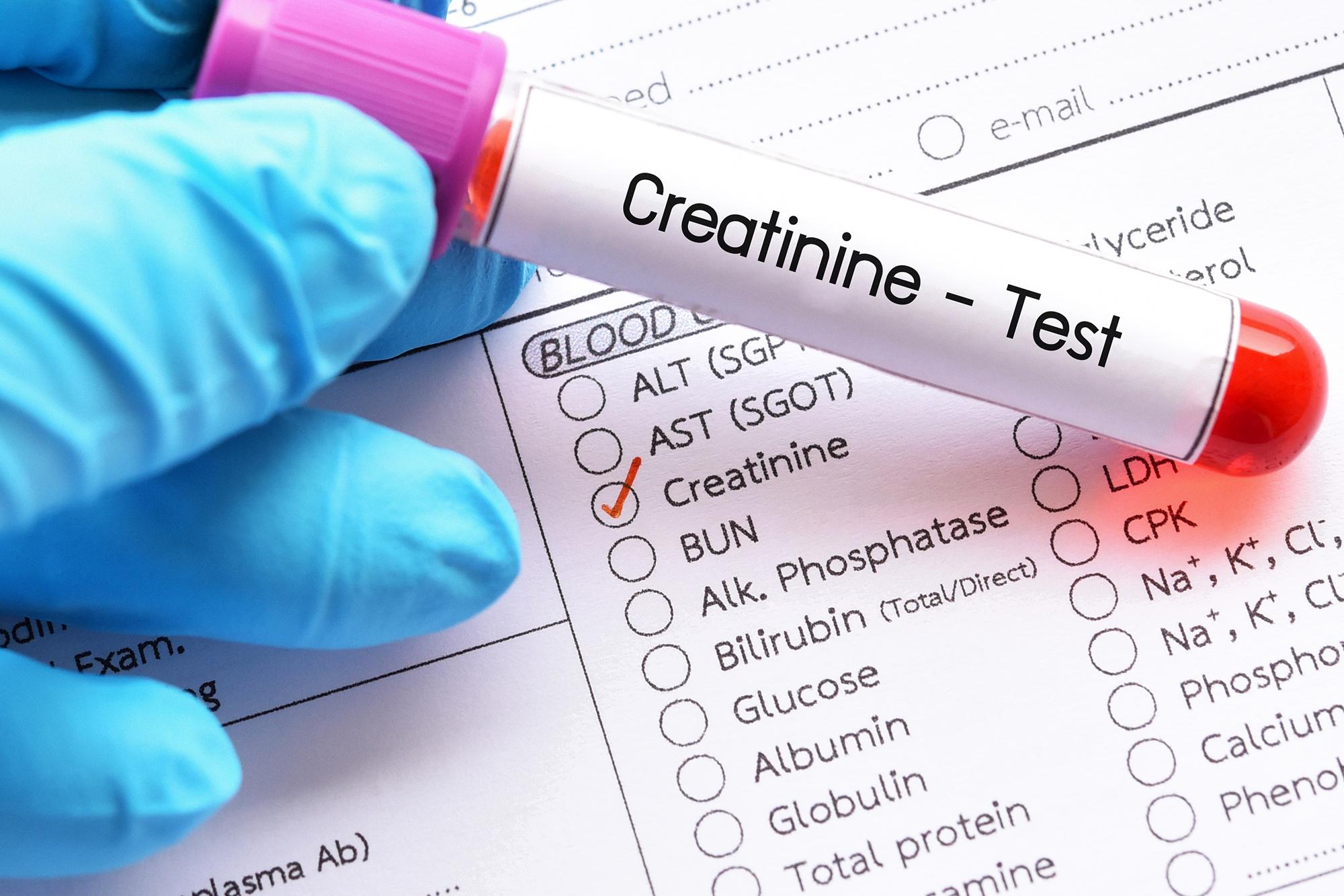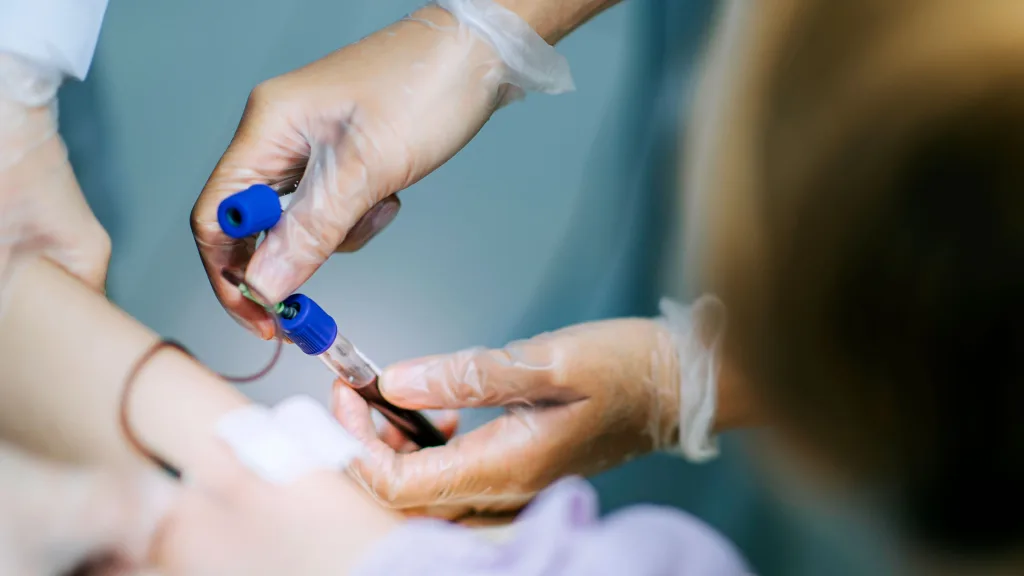Creatinine levels are an important part of assessing renal (kidney) function. Creatinine is a waste product that is produced by the breakdown of muscle tissue, and it is filtered out of the blood and excreted in the urine. Elevated creatinine levels may be an indication of kidney problems, which can range from mild to serious.
Serum creatinine is usually measured during routine blood tests, and it can provide important information about how well your kidneys are working. In healthy individuals, creatinine levels remain relatively stable over time. However, there are certain factors that can cause creatinine levels to change quickly, even in the absence of any underlying medical condition.
Dehydration is one factor that can cause an increase in creatinine levels. When you are dehydrated your body holds onto more water than normal, which can cause a rise in creatinine levels due to increased concentrations of nitrogenous waste products in the blood. This temporary increase should go away when you rehydrate yourself with plenty of fluids and electrolytes.
Another factor that can temporarily raise creatinine levels is consuming large amounts of protein through food sources or nutritional supplements. High intensity exercise can also lead to an increase in creatinine levels as skeletal muscles break down during intense physical activity and release higher amounts of nitrogenous waste products into the bloodstream.
Finally, oter factors like diurnal variations, menstrual cycles, race and diet (and method of meat preparation) can affect serum creatinine readings as well. It’s important to take all these factors into consideration when interpreting your own results as small changes may not necessarily be indicative of a problem with your kidneys.
In general, if you have elevated creatinine levels it’s best to talk to your doctor about what could be causing it and whether any further tests need to be done for further evaluation or treatment. The sooner you address any potential issues with your kidney health, the better off you will be in terms of overall health and wellbeing.
The Rate of Change in Creatinine Levels
In acute renal failure, creatinine levels can change fairly quickly. Typically, serum creatinine increases by 1 to 2 mg/dL per day. If the rate of rise is less than this, it suggests that some residual renal function still exists in the body. In contrast, if the rate of rise is greater than 3 mg/dL per day, this may indicate that other factors such as skeletal muscle breakdown or increased catabolism are also present.

Source: labs.selfdecode.com
Causes of Temporary Increase in Creatinine Levels
Creatinine is a waste product produced by the body when it breaks down muscle. Although it is normally filtered out of the bloodstream by the kidneys, there are sevral factors that can cause temporary increases in creatinine levels. These include dehydration, consuming large amounts of protein, and high-intensity exercise. Dehydration can be caused by not drinking enough fluids, excessive sweating or vomiting. Eating too much protein from foods like red meat or taking dietary supplements containing whey or casein protein may lead to elevated creatinine levels. Finally, engaging in vigorous physical activity can cause an increase in muscle breakdown, resulting in an elevation of creatinine.
Fluctuations in Creatinine Levels Over a 24-Hour Period
Creatinine, a waste product produced by the body’s metabolism of proteins, can fluctuate by 0.5 to 1.0 mg/dL in a day due to several factors. Diurnal variations, such as an individual’s activity level and diet, can cuse creatinine levels to vary throughout the day. Creatinine levels may also be affected by race and the method of meat preparation. These fluctuations do not usually indicate any health concern; however, if you notice extreme fluctuations in your serum creatinine levels that are out of the ordinary for you, it is important to speak with your healthcare provider to rule out any underlying medical condition.
The Variability of Creatinine Levels
Yes, creatinine levels can go up and down. The level of creatinine, a waste product produced when the body breaks down muscle tissue, in the blood is an important indicator of kidney health. Creatinine levels usually remain fairly stable, but in some cases they may fluctuate due to changes in activity level, recent fluid intake and illnesses. For example, if you have been exercising or drinking more fluids than usual, your creatinine levels may rise temporarily until your body adjusts to the increased activity or fluid intake. On the other hand, if you are sick or not eating enough protein-rich foods, your creatinine levels may drop slightly. It is important not to worry abot small changes in your creatinine level as these are usually temporary and can be caused by any number of factors.
Can Overnight Changes Affect Creatinine Levels?
Yes, creatinine levels can change overnight. This is because creatinine levels are affected by physical activity and diet, which can vary from day to day. Additionally, water intake affects creatinine levels, so if you drink more water than usual during the day or overnight, your creatinine levels could increase. To get an accurate assessment of kidney function, your healthcare provider will need to collect multiple urine samples over a 24-hour period to measure changes in creatinine levels.

Normalization of Creatinine Levels: How Long Does It Take?
It typically takes 48 hours for creatinine to normalize after recovery begins. After 12 hours, the normalized urinary biomarker concentration is 0.3 ng/mg, representing a 70% reduction from baseline values. By the 48th hour, the concentration approaches baseline values again as steady state is approached.
The Risks of Slightly Elevated Creatinine Levels
Yes, you shuld be concerned about slightly elevated creatinine. Creatinine is a waste product produced by your muscles that is filtered out of your blood by your kidneys. If the level of creatinine in your blood is higher than normal, it may indicate that your kidneys are not functioning properly. This could be due to an acute infection or injury, chronic kidney disease, or other underlying medical conditions such as diabetes or high blood pressure. It’s important to talk to your doctor about any concerns you have about elevated creatinine levels and to follow-up with further tests if necessary. Your doctor can help you determine the best course of action for managing the condition and preventing further damage to your kidneys.
The Impact of Stress on Creatinine Levels
Yes, stress can cause high creatinine. A recent study found a significant correlation between stress levels and albumin creatinine ratio (p value = 0.002). This means that higher stress levels can result in higher albumin creatinine ratios (correlation coefficient 0.406). While the exact mechanism of this effect is not yet understood, it is likely that increased stress levels have an effect on the body’s ability to regulate kidney function, resulting in higher creatinine levels. It is also important to note that any increase in creatinine should be monitored closely by a healthcare professional to ensure proper diagnosis and treatment if necessary.
Reversing High Creatinine Levels
High creatinine levels can indicate a problem relating to your kidney health. It is important to note that permanent kidney damage cannot be reversed, however thee are ways to help slow the progression of any further damage.
Treatment for high creatinine levels typically involves lifestyle changes such as reducing your salt intake, exercising regularly, and maintaining a healthy weight. Additionally, your doctor may prescribe medications such as ACE inhibitors or angiotensin receptor blockers to help manage your condition and reduce further damage to your kidneys.
It is also important to get regular checkups with your doctor so they can monitor any changes in your creatinine levels. By making these lifestyle changes and following the guidance of your doctor, you may be able to reduce the amount of damage caused by high creatinine levels.

Normal Fluctuations in Creatinine Levels
A normal creatinine fluctuation can vary depending on the size and muscle mass of the individual. Generally, a healthy adult male should have a creatinine level of 0.7 to 1.3 mg/dL (61.9 to 114.9 µmol/L). For women, a normal creatinine level is typically lower at 0.6 to 1.1 mg/dL (53 to 97.2 µmol/L) due to having less muscle mass than men. If your creatinine levels are outside of these parameters, it may be an indication that something is wrong and you should consult with your doctor for further evaluation and testing.
The Maximum Creatinine Level Before Kidney Failure
Creatinine levels typically range from 0.6 to 1.2 milligrams per deciliter (mg/dL) in healthy adults, and they can go as high as 2.0 mg/dL or more in thse with kidney disease. As the kidneys become increasingly impaired, these levels may rise significantly, reaching 8 mg/dL or more in people with end-stage renal disease (ESRD). At this point, the kidneys are not able to adequately filter and remove waste products from the body, leading to a buildup of toxins in the bloodstream. This can cause a wide range of serious health issues, including anemia, heart failure, metabolic acidosis, and electrolyte imbalances. If not treated promptly and effectively, kidney failure can be life-threatening.
When Should Dialysis Begin Based on Creatinine Levels?
At a creatinine level, dialysis will typically start when the creatinine clearance falls to 10-12 cc/minute. Creatinine is a waste product produced by the body during normal muscle metabolism, and is normally eliminated from the body throgh the kidneys. When the kidneys are not functioning properly and cannot efficiently eliminate creatinine, its concentration in the blood increases. As creatinine levels become higher than normal, it can be an indication of impaired kidney function. If this occurs, a doctor may order a creatinine clearance test to measure the rate of filtration of creatinine in the kidneys. If this rate drops below 10-12 cc/minute, it indicates that dialysis may be necessary in order to maintain adequate kidney function.
Conclusion
In conclusion, creatinine levels can vary significantly depending on a number of factors, including renal function, dehydration, dietary protein intake, and exercise. In the case of acute renal failure, creatinine levels can rise 1 to 2 mg/dL per day if residual renal function is present. If the rate of rise exceeds 3 mg/dL per day, this could indicate that skeletal muscle or increased catabolism is also present. It is important to note that small changes in creatinine levels should not be cause for concern as these fluctuations are normal and can be attributed to many different factors.
